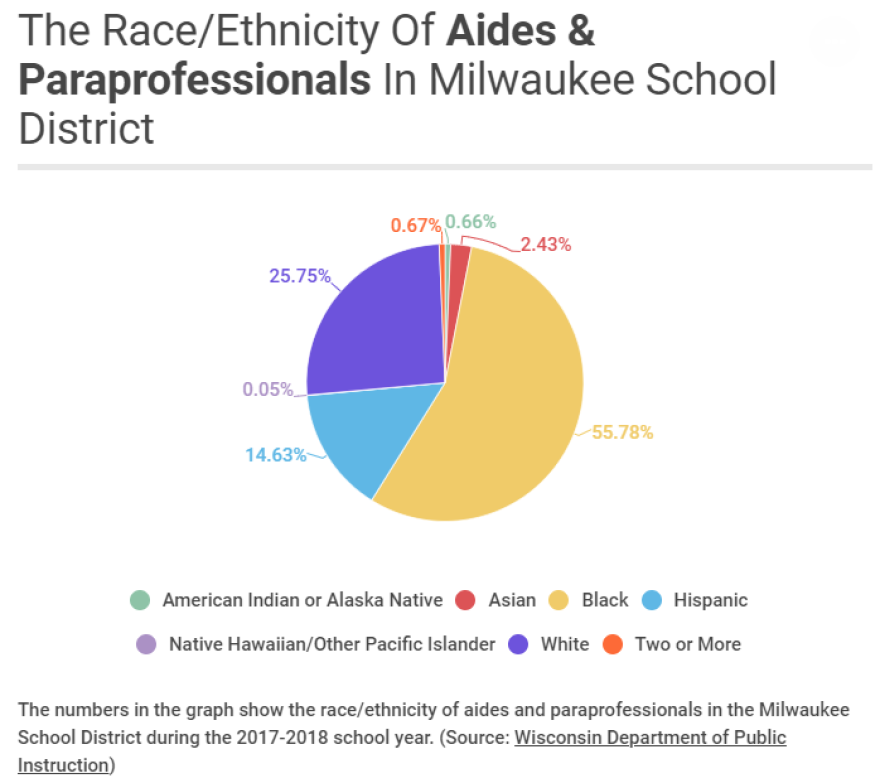Research show that students of color are more likely to succeed if they have at least one teacher who looks like them. But in many urban districts like Milwaukee, there is a mismatch between students and teachers. Teachers are mostly white, and students are mostly black or Hispanic.
Last week, Beats Me — our series dedicated to answering your questions about race, education, innovation and the environment — examined how this racial imbalance impacts student achievement.
Now, we turn to a possible solution by visiting schools that are looking inside their own classrooms to recruit more teachers of color.
Recruit & Train From Within
Here’s a common scenario in Milwaukee schools. You go to a classroom of mostly black students, and their teacher is white, usually a woman.

But, sometimes there’s another adult in the classroom, called a paraprofessional or teaching assistant. Chances are, that adult is a person of color. Someone like Burgundy May, who has been an educational assistant at charter school Milwaukee College Prep (MCP) for seven years.
“I think a lot of times as TAs we think that ‘oh, that’s the limit for us,’” May says. “Because of not having the availability to get back in school and needing to work full time.”
There are a lot of people like May in Milwaukee schools – TAs who get glowing reviews but don’t have the time or money to make the leap to teaching.
“We had all these high-quality people who showed great promise to be phenomenal teachers,” Milwaukee College Prep CEO Robb Rauh says. “So it just made sense to find some way to work with them to help get them certified.”
A couple years ago, MCP and Seton Catholic Schools partnered with Concordia University to create a teacher training program specifically for paraprofessionals.
It’s called Project INVEST and is geared toward TAs who already have some college credits or an associate’s degree.
Students get financial aid from Concordia and the school they work for to attend the two-year accelerated program. They meet one evening per week for class. And instead of having to work as an unpaid student teacher, their jobs as paraprofessionals count toward the student teaching requirement.
May is in the first Project INVEST cohort of about 20 students. She hopes to get her certification next year.
“It’s something that I never thought was attainable,” May says. “It was just so far away and now for it to be so close -- it makes me emotional. Because I’m like really proud of myself and the growth that I made.”
MCP's Rauh says he’s looking forward to hiring the soon-to-be-teachers. "We’re like, drooling. We can’t wait,” he explains. “We struggle mightily to fill positions and so just to have a deeper bench and a deeper pool is going to be fantastic.”
Potential To Increase Diversity
That teacher shortage is the main incentive behind programs like this. But they also have potential to make Milwaukee’s teacher pool more diverse.
Data on teacher demographics are only available for public and charter schools, not private schools. The numbers we do have illustrate that the Milwaukee teacher workforce is overwhelmingly white (70 percent.)
LISTEN: MPS Students Weigh In On Having Diverse Teachers
But, the demographics of paraprofessionals align much more closely with students. Fifty-five percent of MPS paraprofessionals are black, compared to 52 percent of students.
Teachers earn twice as much as paraprofessionals. In MPS, the average starting salary for a paraprofessional is $18,425. For a teacher, it's $42,500.

There is another new program like Concordia’s in Milwaukee. This one is for MPS paraprofessionals interested in special education. It’s a collaboration between MPS, MATC, and UWM called PLUS: Professional Licensure with Undergraduate Support.
Sadique Isahaku is a dean at MATC who helps oversee the program, which began last year.
“It was started as a result of the shortage of special education teachers in MPS,” Isahaku explains. “And also as a way to find sustainable teachers -- teachers who will remain in the system.”
The program allows paraprofessionals to earn their degree while working full time. They also get financial support, partially from a U.S. Department of Education grant.
Enthusiasm For Future
Paraprofessional Lynn Blue says it’s about time. “I’m telling you, I’m ready. I’m so ready,” Blue says. “I wish they had this program 20 years ago.”

Blue has been a special education paraprofessional at Washington High School for ten years. She says she’s repeatedly told principals she wanted to become a teacher, but that she needed financial support.
Now it’s happening. Blue is entering her second year in the PLUS program. She was one of the first paraprofessionals nominated by her principal to participate.
On a recent morning, Blue was sitting with two high schoolers who have disabilities. They were working on basic reading skills. She says as a teacher, she’ll be able to do more of this kind of work.
“So I can say, ‘You know what? I taught that kid how to read.’”
Blue expects to graduate with her UWM degree in 2021. She and others in these programs will help make Milwaukee’s teacher workforce a little more representative of the students it serves.
Have a question about education you'd like WUWM's Emily Files to dig into? Submit it below.
_





